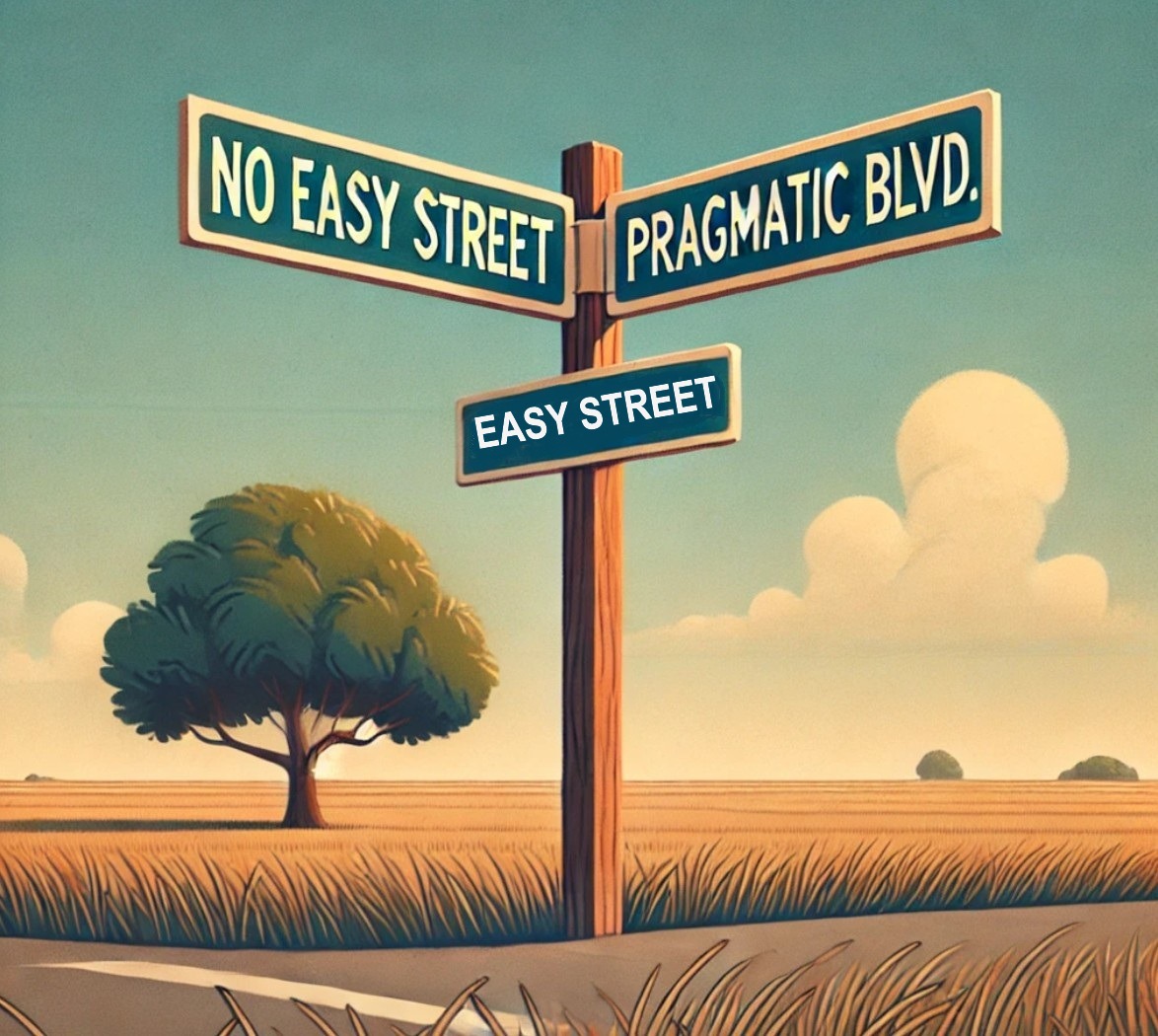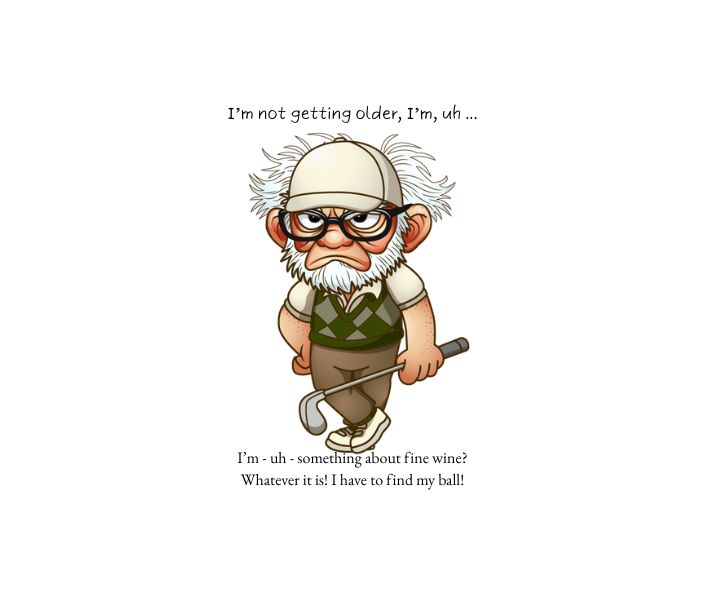Is It Just Rhetoric?
Think pragmatically:
Retirement: “often romanticized as an endless vacation but, in reality, is a logistical puzzle wrapped in financial calculations and existential dilemmas.”
We may like to think of it as an endless vacation, but in reality, retirement always ends badly; however, the in-between is decision! So, perhaps you want your retirement thinking to be less about freedom, and more about not yelling at your appliances because you forget how to use them?
In other words, because it is esoteric by nature and unique to the individual: retirement requires planning, but not just the financial aspects, it is the mental and physical aspects of it that are far more important.
It’s an Art, Not a Science
We have already covered most of the topics about retirement in previous posts—from “What it means to retire on nothing” to “What the FUN TIMES can be for those with the money to play golf for the rest of their lives.” Think about it! EVERYONE’S retirement cannot be categorized and cataloged by specific outcomes or conditions. Why? Because we are snowflakes, and like snowflakes, from a distance, we are exactly the same, but examined closely, we are all completely different!
That said, it remains logical that the happiest retirees are not necessarily those with the most wealth. Personally speaking, my income is mediocre at best, but my happiness is not measured by what I can spend, but more so, by what I spend it on. How I feel from day to day, and what I do with what I have, i.e., my attitude; that is what matters.
If we feel miserable with our lot in life, it is not going to matter where we live, how we live, or how much we own—i.e., the great American dream, as I’m certain you are already aware, does not bring happiness. Happiness is a butterfly, we have to search for it, and to do that, we have to be pragmatic.
Misconception Is the Root of All Unhappiness
Pragmatism! What is it? What does it do for us?
Defined by M.W. (No, not Martha Washington! Merriam-Webster!): “A practical approach to problems and affairs,” i.e., no outlandish notions—just a reasonable, patient, practical approach toward anything. There are two ways to live retirement. Wishing it was better, or, Making it better. Doing that requires learning, thinking, planning, and doing.
Brad Stokes, a software engineer who endorses something called “The Agile method” of software development, says,
“Pragmatism is an approach that evaluates theories or beliefs in terms of the success of their practical application.”
Put that to use in your thinking about retirement! We can be TOLD all day what retirement is or is not, but OUR RETIREMENT is ultimately up to us!
1.) Do I have the same savings and income as everyone else?
(No, a little more, a little less … but, no!)
2.) What freedoms will the size of my pensions and savings afford me?
(Probably no yacht involved, but, hey! can I afford a canoe.)
3.) What about my health? Do I have the health and stamina to pursue the things I want to do?
(Some do some don’t, we all have limitations, but through social interactions, there is much we can find to enjoy.)
4.) Do I have skills and training that will allow me to pursue other work and meaningful activities after retirement?
(You’ve made it this far, use what you know, and don’t be afraid to try something new. Learning keeps us going!)
5.) Do I want to pursue a new job or another career after retirement?
(If you need to you can, but, if you don’t need to—you can!)
6.) Is it time to begin volunteering or seeking ways to contribute to others?
(We have spent our lives earning what we need to stay alive, maybe it’s time to give back?)
A few practical questions from the long list that you can ask yourself BEFORE you retire—or if you find yourself already retired and wondering what to do with yourself, ask them anyway.
Stokes goes on to say that, from his understanding, pragmatism is both contextual and measuring.
CONTEXTUAL:
Contextual pragmatism deals with reality. “It is about understanding that the IDEA may be flawed and therefore needs to be assessed against the reality of the current circumstances.”
In other words, how was retirement defined for you? Was it by some 30-something broker telling you about the “Golden Years”? Or do you have retired friends to talk to? Have you investigated the cost, evaluated your health, and determined what you would like to do AFTER you retire?
MEASURING:
“At the end of the day (measuring), it is always subjective. I have come to accept that the answer will be radically different for many people.”
Now, Mr. Stokes is using these descriptions in a completely different scenario, but as you can see, when you think about things pragmatically, this thinking applies to any scenario. It is nothing more than “thinking ahead in practical terms while comparing ideas and thoughts to actual outcomes.”
The Art of Aging Without Becoming an Asshole
From the viewpoint of pragmatic thinking, it has been my observation that many older people, especially Baby Boomers, do not want to let go of the past. The context of their conversations usually involve something like, “Well, back in my day we…” or the like. Well, I am a Boomer, but not one of those. Consequently, to them, everything that is ‘NOW,’ is bad! Everything sucks!
“This damn cell phone is a piece of junk; I can never get to my messages and when I try to send an email it … !”
Or, “My children gave me a new cordless vacuum, but I never use it because I can’t figure out how it works!”
All Boomers, according to Paul Edward Begala, an American political consultant and political commentator, are such. He published a scathing, vitriolic article regarding Boomers back in 2017 that essentially blames Boomers for all the ills of the modern day world. Yes, we came through some turbulent times, but not everyone participated.
Be Progressive, Learn Something New, Adapt
In my experience as a 73 year old Boomer, it’s never the phone, the vacuum, the microwave, or anything else; it’s me! It is my impatience; me, the person operating it.
Sadly, there are two types of older pensioners, and I have personally known and helped both types. There are those who want to take the time to learn and adapt well. There are also those who say, “I don’t need all that s**t! I just want to make a phone call!” So they can return to their brooding about the past while basking in the fear of what lays ahead.
However; if you are happy living in the past; remembering and wishing, that too is an option, although it will take its toll on you. The best retirees ARE NOT the ones waxing poetic about 1973; they’re the ones still evolving.
Retirement requires adaptability—learning new tech, engaging with younger generations, and staying curious rather than curmudgeonly.
All That To Say
So, what will your retirement be? A great liberation or just a well-funded midlife crisis?
The answer depends on you and your pragmatic approach to retirement. Be realistic and approach each day with practicality and foresight.
But one thing’s for sure—waiting around for the government to make it work for you isn’t a strategy. It’s a gamble. You didn’t work this long to let bureaucrats determine how to spend your final years.
Share This Story:
Leave A Comment
You must be logged in to post a comment.











